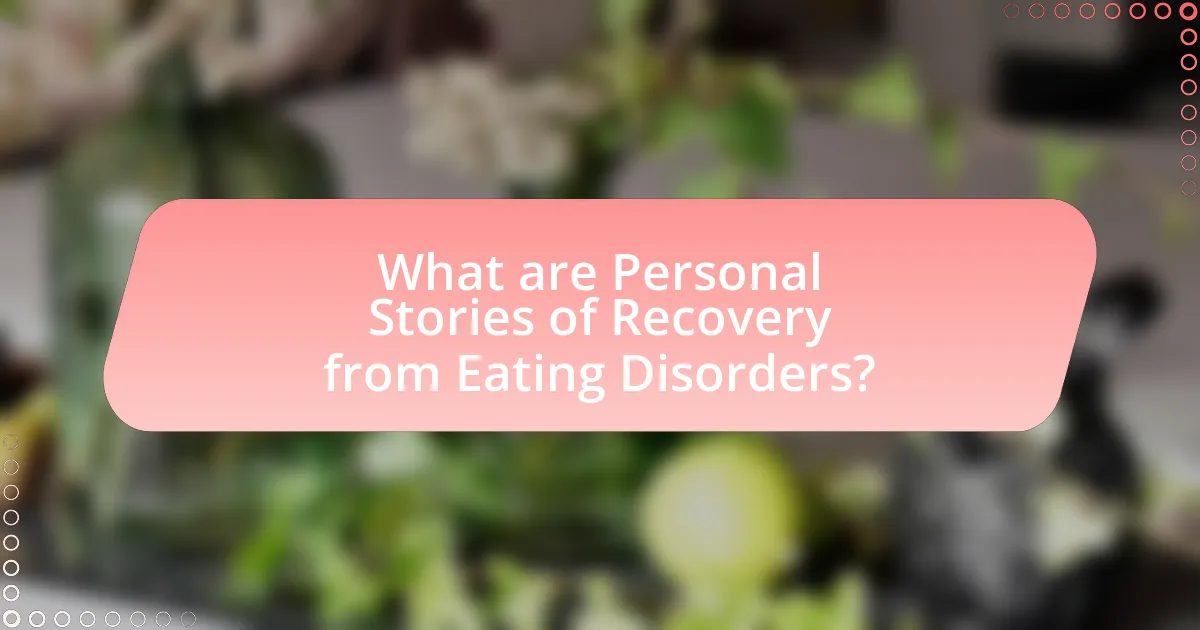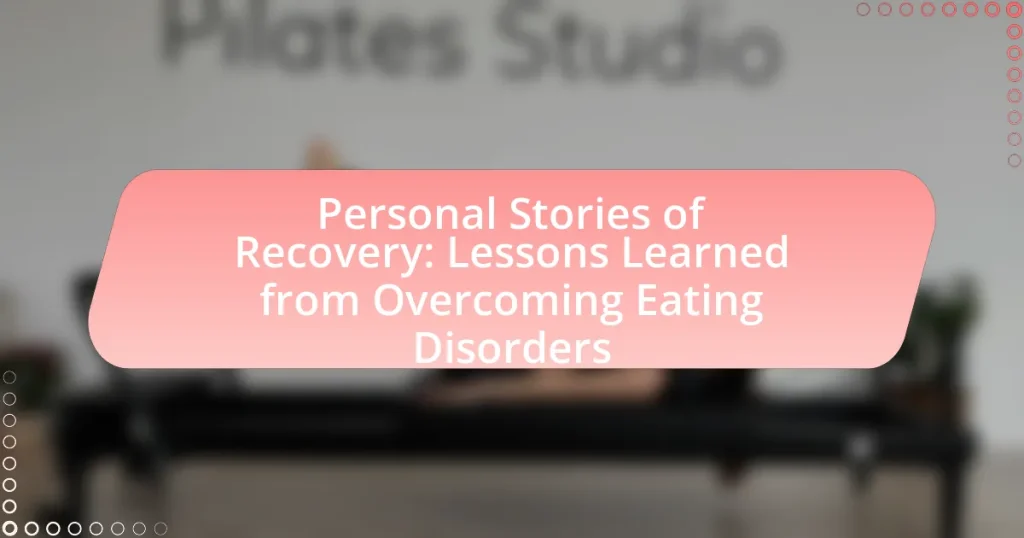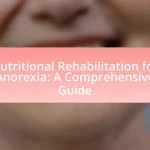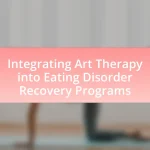Personal stories of recovery from eating disorders provide valuable insights into the individual journeys of overcoming these complex conditions. These narratives highlight the struggles faced, treatment processes undertaken, and personal growth achieved, emphasizing themes such as resilience, the importance of support systems, and self-acceptance. The article explores how sharing these experiences fosters empathy, reduces stigma, and inspires others facing similar challenges, while also discussing effective coping strategies, the role of professional help, and the significance of mindfulness in maintaining long-term recovery. Key lessons learned from these stories underscore the necessity of seeking help, building supportive networks, and practicing self-compassion throughout the recovery process.

What are Personal Stories of Recovery from Eating Disorders?
Personal stories of recovery from eating disorders are individual narratives that illustrate the journey of overcoming these conditions. These accounts often highlight the struggles faced, the treatment processes undertaken, and the personal growth achieved during recovery. For instance, many individuals share experiences of therapy, support groups, and lifestyle changes that contributed to their healing. Research indicates that sharing such stories can foster hope and resilience in others facing similar challenges, as evidenced by studies showing that personal testimonials can significantly impact the recovery process and encourage others to seek help.
How do personal stories contribute to understanding eating disorders?
Personal stories significantly enhance the understanding of eating disorders by providing firsthand insights into the emotional and psychological experiences of individuals affected by these conditions. These narratives illustrate the complexities of eating disorders, revealing the underlying factors such as trauma, societal pressures, and personal struggles that contribute to their development. Research indicates that personal accounts can foster empathy and awareness, as they humanize the statistics and clinical definitions often associated with eating disorders. For instance, a study published in the Journal of Eating Disorders highlights that sharing personal experiences can reduce stigma and encourage open discussions, ultimately leading to better support systems for those in recovery.
What common themes emerge in these recovery stories?
Common themes in recovery stories from overcoming eating disorders include resilience, the importance of support systems, and the journey of self-acceptance. Resilience is often highlighted as individuals demonstrate the ability to overcome setbacks and challenges during their recovery process. Support systems, such as family, friends, and professional help, play a crucial role in providing encouragement and accountability, which is frequently mentioned in these narratives. Additionally, the journey of self-acceptance is a recurring theme, where individuals learn to embrace their bodies and develop a healthier relationship with food and self-image. These themes are consistently reflected in various personal accounts, illustrating the multifaceted nature of recovery from eating disorders.
How do individual experiences differ in the context of recovery?
Individual experiences in the context of recovery from eating disorders vary significantly due to factors such as personal history, support systems, and coping mechanisms. For instance, individuals with a strong support network often report more positive recovery outcomes compared to those who lack such support, as evidenced by a study published in the Journal of Eating Disorders, which found that social support plays a crucial role in the recovery process. Additionally, personal history, including previous trauma or mental health issues, can influence the recovery trajectory, with some individuals requiring more intensive therapeutic interventions. These variations highlight the complexity of recovery, emphasizing that it is not a one-size-fits-all process.
Why are personal narratives important in the recovery process?
Personal narratives are important in the recovery process because they provide individuals with a means to articulate their experiences, fostering self-reflection and understanding. By sharing their stories, individuals can identify patterns in their behavior and emotions, which is crucial for recognizing triggers and developing coping strategies. Research indicates that storytelling can enhance emotional processing and promote healing, as evidenced by studies showing that individuals who engage in narrative therapy report improved mental health outcomes. Furthermore, personal narratives can create a sense of community and support, as shared experiences resonate with others facing similar challenges, thereby reducing feelings of isolation.
How do these stories inspire others facing similar challenges?
Personal stories of recovery from eating disorders inspire others facing similar challenges by providing relatable experiences and demonstrating the possibility of overcoming adversity. These narratives often highlight the emotional struggles, coping mechanisms, and support systems that individuals utilized, which can resonate with those currently battling similar issues. For instance, research published in the Journal of Eating Disorders indicates that sharing personal recovery stories can foster hope and motivation, as individuals see tangible examples of success and resilience. This connection encourages others to seek help and believe in their own potential for recovery.
What role does storytelling play in healing and self-acceptance?
Storytelling plays a crucial role in healing and self-acceptance by allowing individuals to articulate their experiences and emotions, which fosters understanding and connection. Through sharing personal narratives, individuals can reframe their struggles, making sense of their journeys and promoting emotional release. Research indicates that storytelling can enhance psychological resilience; for instance, a study published in the Journal of Clinical Psychology found that narrative therapy significantly improved self-acceptance and reduced symptoms of anxiety and depression among participants. This process not only validates personal experiences but also encourages empathy from others, creating a supportive environment essential for recovery from eating disorders.

What lessons can be learned from these recovery stories?
Recovery stories from individuals overcoming eating disorders highlight several key lessons. Firstly, the importance of seeking help is evident, as many individuals report that professional support significantly contributed to their recovery. Research indicates that early intervention can lead to better outcomes, with studies showing that individuals who seek treatment within the first year of symptoms have a higher chance of full recovery. Secondly, the value of community and support networks is emphasized; many individuals credit friends, family, and support groups as crucial elements in their healing process. This aligns with findings from the National Eating Disorders Association, which states that social support can enhance resilience and coping strategies. Lastly, the necessity of self-compassion and patience during recovery is a recurring theme, as individuals learn to navigate setbacks and celebrate small victories, reinforcing the idea that recovery is a journey rather than a destination.
How do individuals identify key turning points in their recovery?
Individuals identify key turning points in their recovery by reflecting on significant changes in their thoughts, behaviors, and emotional states. This self-reflection often involves recognizing moments of insight, such as the realization of the impact of their eating disorder on their life or the decision to seek help. Research indicates that these turning points can be marked by specific events, such as a supportive conversation with a loved one or a pivotal therapy session, which catalyze a shift in perspective and motivation. For instance, a study published in the Journal of Eating Disorders highlights that many individuals report a turning point when they begin to prioritize their health over societal pressures, indicating a critical change in their recovery journey.
What strategies have proven effective for overcoming eating disorders?
Cognitive Behavioral Therapy (CBT) has proven effective for overcoming eating disorders by addressing the underlying thought patterns and behaviors associated with these conditions. Research indicates that CBT can significantly reduce symptoms of disorders such as anorexia, bulimia, and binge eating, with studies showing that approximately 50-60% of individuals experience substantial improvement after treatment. Additionally, nutritional counseling and support groups enhance recovery by providing education on healthy eating habits and fostering a sense of community, which has been shown to improve long-term outcomes.
How do support systems influence recovery journeys?
Support systems significantly enhance recovery journeys by providing emotional, social, and practical support. Research indicates that individuals with strong support networks experience lower relapse rates and improved mental health outcomes during recovery from eating disorders. For instance, a study published in the Journal of Eating Disorders found that participants who engaged with supportive family and friends reported higher levels of motivation and adherence to treatment plans. This highlights the critical role that encouragement and accountability from support systems play in fostering resilience and promoting sustained recovery.
What are the emotional and psychological impacts of recovery?
The emotional and psychological impacts of recovery from eating disorders include improved self-esteem, enhanced emotional regulation, and a greater sense of identity. Individuals often experience a reduction in anxiety and depression as they develop healthier coping mechanisms and rebuild relationships. Research indicates that approximately 60% of individuals who undergo treatment for eating disorders report significant improvements in their emotional well-being within a year of recovery. Additionally, studies show that recovery fosters resilience, allowing individuals to better manage stress and adversity, which further contributes to their overall mental health.
How do individuals cope with setbacks during their recovery?
Individuals cope with setbacks during their recovery by employing various strategies such as seeking support, practicing self-compassion, and reframing negative thoughts. Research indicates that social support from friends, family, or support groups significantly enhances resilience, helping individuals navigate challenges more effectively. Additionally, self-compassion allows individuals to treat themselves with kindness during difficult times, reducing feelings of shame and isolation. Cognitive reframing, a technique used in cognitive-behavioral therapy, helps individuals shift their perspective on setbacks, viewing them as opportunities for growth rather than failures. These coping mechanisms are essential for maintaining motivation and fostering a positive recovery journey.
What mental health resources are beneficial for those recovering?
Mental health resources beneficial for those recovering from eating disorders include therapy, support groups, and educational materials. Therapy, particularly cognitive-behavioral therapy (CBT), has been shown to effectively address the underlying issues related to eating disorders, with studies indicating that CBT can lead to significant improvements in recovery rates. Support groups provide a community of individuals who share similar experiences, fostering a sense of belonging and understanding, which is crucial for recovery. Educational materials, such as books and online resources, offer valuable information about eating disorders, helping individuals and their families understand the complexities of these conditions and the recovery process.

How can these lessons be applied to support others?
The lessons learned from personal stories of recovery can be applied to support others by fostering empathy, sharing coping strategies, and creating supportive environments. Empathy allows individuals to connect with those struggling, making them feel understood and less isolated. Sharing coping strategies, such as mindfulness techniques or nutritional education, provides practical tools that others can implement in their recovery journey. Creating supportive environments, whether in community groups or online forums, encourages open dialogue and reduces stigma, which is crucial for individuals facing eating disorders. Research indicates that peer support significantly enhances recovery outcomes, as seen in studies published in the Journal of Eating Disorders, demonstrating the effectiveness of shared experiences in promoting healing.
What practical steps can individuals take to aid their recovery?
Individuals can aid their recovery from eating disorders by establishing a structured meal plan that includes balanced nutrition. This approach ensures that individuals receive adequate calories and nutrients, which is essential for physical and mental health recovery. Research indicates that structured meal plans can significantly improve recovery outcomes, as they help individuals develop a healthier relationship with food and reduce anxiety around eating. Additionally, engaging in regular therapy sessions, such as cognitive-behavioral therapy, has been shown to effectively address underlying psychological issues associated with eating disorders, further supporting the recovery process.
How can friends and family provide effective support?
Friends and family can provide effective support by actively listening and validating the feelings of individuals recovering from eating disorders. This approach fosters a safe environment where the person feels understood and less isolated. Research indicates that emotional support from loved ones significantly enhances recovery outcomes, as seen in a study published in the Journal of Eating Disorders, which found that individuals with strong social support networks reported lower levels of eating disorder symptoms and higher levels of recovery motivation. By engaging in open conversations, offering encouragement, and participating in treatment processes, friends and family can play a crucial role in the healing journey.
What resources are available for those seeking recovery?
Resources available for those seeking recovery from eating disorders include support groups, therapy options, and educational materials. Support groups such as the National Eating Disorders Association (NEDA) provide community and shared experiences, while therapy options like cognitive-behavioral therapy (CBT) have been shown to be effective in treating eating disorders, as evidenced by numerous studies. Educational materials from reputable organizations offer information on recovery strategies and coping mechanisms, further aiding individuals in their journey toward recovery.
How can online communities assist in the recovery process?
Online communities can significantly assist in the recovery process by providing support, shared experiences, and resources for individuals overcoming eating disorders. These platforms enable members to connect with others who understand their struggles, fostering a sense of belonging and reducing feelings of isolation. Research indicates that peer support in online settings can enhance motivation and accountability, which are crucial for recovery. For instance, a study published in the Journal of Eating Disorders found that individuals participating in online support groups reported improved emotional well-being and a greater sense of community, which positively impacted their recovery journey.
What professional help should individuals consider during recovery?
Individuals recovering from eating disorders should consider seeking help from licensed mental health professionals, such as psychologists or psychiatrists, who specialize in eating disorders. These professionals can provide evidence-based therapies, such as Cognitive Behavioral Therapy (CBT), which has been shown to be effective in treating eating disorders, as supported by research published in the Journal of Eating Disorders. Additionally, registered dietitians can offer nutritional guidance and meal planning tailored to individual recovery needs, ensuring a balanced approach to food intake. Support groups led by trained facilitators can also provide a community aspect, helping individuals feel less isolated during their recovery journey.
What are the best practices for maintaining long-term recovery?
The best practices for maintaining long-term recovery from eating disorders include establishing a strong support network, engaging in regular therapy, practicing self-care, and setting realistic goals. A strong support network, consisting of friends, family, and support groups, provides emotional encouragement and accountability, which are crucial for sustained recovery. Regular therapy, particularly cognitive-behavioral therapy, has been shown to help individuals develop coping strategies and address underlying issues related to their eating disorders. Self-care practices, such as maintaining a balanced diet, exercising mindfully, and prioritizing mental health, contribute to overall well-being and resilience against relapse. Setting realistic goals helps individuals track their progress and stay motivated, reducing the likelihood of feeling overwhelmed. Research indicates that individuals who actively engage in these practices have higher rates of long-term recovery success, as evidenced by studies published in journals like the International Journal of Eating Disorders.
How can individuals develop a sustainable self-care routine?
Individuals can develop a sustainable self-care routine by establishing consistent practices that prioritize mental and physical well-being. This involves setting specific, achievable goals such as daily exercise, balanced nutrition, and mindfulness activities. Research indicates that routines incorporating regular physical activity can significantly improve mood and reduce anxiety, which is crucial for those recovering from eating disorders. For instance, a study published in the Journal of Eating Disorders found that structured self-care practices contribute to improved emotional regulation and resilience in individuals recovering from such conditions. By integrating these elements into daily life, individuals can create a self-care routine that supports long-term recovery and overall health.
What role does mindfulness play in ongoing recovery efforts?
Mindfulness plays a crucial role in ongoing recovery efforts from eating disorders by enhancing self-awareness and emotional regulation. Practicing mindfulness helps individuals recognize their thoughts and feelings without judgment, which can reduce anxiety and promote healthier coping mechanisms. Research indicates that mindfulness-based interventions significantly improve psychological well-being and reduce relapse rates in individuals recovering from eating disorders. For instance, a study published in the Journal of Eating Disorders found that participants who engaged in mindfulness practices reported lower levels of disordered eating behaviors and improved body image. This evidence underscores the effectiveness of mindfulness in supporting sustained recovery efforts.


